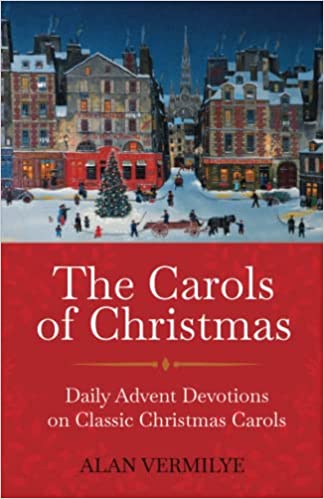I am excited to begin our Advent study of Alan Vermilye’s book The Carols of Christmas. Tonight, we are singing and discussing O Holy Night.
Hopefully, you have read through the daily meditations on the carol. In following through these meditations, or at least following through the carol itself, we sing the gospel message. Singing half a carol is like reading only half a book or watching only half of a movie – we never truly get to the end.
The Beginning:
The carol begins at night and in the dark. But within this darkness, the stars are shining. It is the darkness into which Christ’s light shines and into which he came to overcome. John 1:5. (Day 2). This darkness, as the carol tells us, is “the world in sin and error pining.” For the first verse of the carol, it is not simply that the world lies in the sin of Adam, but that the world continues to languish in and suffer from this affliction. Rom. 5:12-21. (Day 3). The first verse ends, however, with the message of hope: “For yonder breaks a new and glorious morn.” As Vermilye points out, the first verse ends with the hope and expectation of God’s faithfulness – “The steadfast love of the Lord never ceases and his mercies never come to an end.” Lam. 3:22. (Day 4).
The Middle:
The second verse sings of the nativity scene. This scene, however, only tells of the Christ-child and the Magi. There is no Mary, no shepherds, and no drummer boy. It is this verse that best brings out the identity of the writer and the translator of the carol. Both men were outside of mainstream orthodox Christianity – not unlike the “wise men from Orient land.” But it is to the outsider, like the wise men, to whom we are instructed by Christ himself to go. Matt. 28:19
The End:
The carol ends with the great eschatological proclamation of the end of oppression and the beginning of the reign of love. The final verse begins with the words “Truly He taught us to love one another.” These words go back to Jesus’ statement on Maudy Thursday that “A new commandment (mandamus in Latin) I give to you, that you love one another.” John 13:34. As Vermilye writes, love “is not so much about the intrinsic value of each individual life but how that life touches so many other lives around it.” (Day 6). More importantly, the gospel message of God’s Incarnation changes the relationship dynamic between people from one of power and exploitation to one of love and respect.
This change in the relationship dynamic is the central theme of verse 3. There the carol says “Chains shall he break, for the slave is our brother / And in his name all oppression shall cease.” It is this verse that caught the attention of the abolitionist John Sullivan in 1855 when he decided to translate and publish the carol for his American audience. (Day 7). This verse speaks to us on both an earthly and spiritual plane. Jesus’s gospel message is a gospel that “sets at liberty those who are oppressed.” Luke 4:18. This oppression is a very real situation throughout history. God delivered the Israelites out of slavery in ancient Egypt and throughout history, he has raised up people like Harriet Tubman to continue His physical deliverance from those takes not only the form of slavery. But the gospel is also about freedom from slavery to the spiritual evil of this age. Rom. 6:17, Gal. 4:3. The coming of the light of God into this world is the coming of salvation to all under the bonds of spiritual evil as well.
Dinner is at 6. The menu is chicken and biscuits. Singing and discussion around 6:45. Hope to see you here!
O Holy night! The stars are brightly shining
It is the night of our dear Savior’s birth
Long lay the world in sin and error pining
‘Til He appears and the soul felt its worth
A thrill of hope the weary world rejoices
For yonder breaks a new and glorious morn
Fall on your knees; O hear the Angel voices!
O night divine, O night when Christ was born
O night, O Holy night, O night divine!
Led by the light of Faith serenely beaming
With glowing hearts by His cradle we stand
So led by light of a star sweetly gleaming
Here come the Wise Men from Orient land
The King of kings lay thus in lowly manger
In all our trials born to be our friend
He knows our need, to our weakness is no stranger
Behold your King; before Him lowly bend
Behold your King; before Him lowly bend
Truly He taught us to love one another;
His law is love and His Gospel is Peace
Chains shall He break, for the slave is our brother
And in His name, all oppression shall cease
Sweet hymns of joy in grateful chorus raise we
Let all within us Praise His Holy name
Christ is the Lord; O praise His name forever!
His power and glory evermore proclaim
His power and glory evermore proclaim

